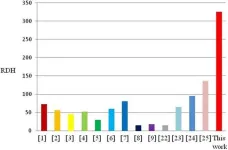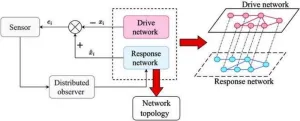(Press-News.org) Berlin, Germany: Differences in socioeconomic status (SES) are known to be linked to differences in the risk of developing disease. While people with lower SES are more likely to develop complex diseases such as diabetes and cardiovascular disease, those with a higher SES are at increased risk of developing certain types of cancer. Using biobank and national register data, researchers from Finland have now found that people with lower SES (educational achievement and occupation) have a greater genetic susceptibility to develop many other complex diseases such as rheumatoid arthritis, lung cancer, depression, and alcohol use disorder, as well as Type 2 diabetes, whereas those with a higher SES are more at risk of developing breast, prostate, and all cancers.
Dr Fiona Hagenbeek, a postdoctoral researcher at the Institute for Molecular Medicine Finland (FIMM), University of Helsinki, Finland, who will present her group‘s work at the annual conference of the European Society of Human Genetics today (Sunday), says that these promising initial results mean that it is likely that polygenic risk scores, which measure an individual‘s risk of a particular disease based on genetic information, could be added to the screening protocols for multiple diseases and in several countries. “Understanding that the impact of polygenic scores on disease risk is context-dependent may lead to further stratified screening protocols,“ she says. “For example, in the future, screening protocols for breast cancer may be adapted so that females with a high genetic risk and who are highly educated receive earlier or more frequent screening than females with lower genetic risk or less education.”
The researchers used genomics, SES, and health data from approximately 280,000 Finnish individuals in the FinnGen study, a research project in genomics and personalised medicine that aims to understand the genetic basis of diseases. The participants were aged 35 – 80 at the time of entry into the study. The study aimed to systematically assess the evidence of gene-environment interaction (GxE) through the differing genetic susceptibility to disease in diverse socioeconomic groups. While previous studies have shown the presence of such a difference in risk, this is the first to systematically assess GxE for SES in 19 complex diseases that have a high burden in high-income countries.
“Most clinical risk prediction models include basic demographic information such as biological sex and age, recognising that disease incidence differs between males and females, and is age-dependent,“ says Dr Hagenbeek. “Acknowledging that such context also matters when incorporating genetic information into healthcare is an important first step. But now, we can show that the genetic prediction of disease risk also depends on an individual’s socioeconomic background. So while our genetic information does not change throughout our lifetime, the impact of genetics on disease risk changes as we age or change our circumstances.“
The researchers hope that the study will be followed up to see whether further differences can be identified when looking at more specific aspects of educational and professional achievement. While their current results for profession generally mirror those for education, they do not match completely, indicating that each can provide unique information on the interplay of socioeconomic status and genetics on disease risk. Expanding the list of socioeconomic indices to be studied may bring about new insights into how the overlapping aspects of a person’s socioeconomic environment may, together with genetic information, influence their disease risk.
They will also compare their results across biobank studies from Finland, UK, Norway, and Estonia through the INTERVENE* consortium, allowing them to determine whether there are country or biobank-specific issues involved. “Our study focused solely on individuals of European ancestry, and it will also be important in the future to see whether our observations concerning the interplay of socioeconomic status and genetics for disease risk are replicated in people of multiple ancestries in higher and lower-income countries,“ says Dr Hagenbeek. “As the overall aim of incorporating genetic information into healthcare is to facilitate personalised medicine, we should not treat genetic information as ‘one size fits all‘. Rather, we should investigate and then include the circumstances that modify genetic risk when carrying out disease prediction.“
Professor Alexandre Reymond, from the Center for Integrative Genomics, University of Lausanne, Lausanne, Switzerland, and chair of the conference, said: “To really move to personalised health it will be essential to gauge both genetic and environmental risks. We should commend our Finnish colleagues for their part in spearheading this effort.”
(ends)
* INTERVENE is the 'International consortium of integrative genomics prediction’, (https://www.interveneproject.eu/), a Horizon 2020 funded collaboration between 17 organizations from nine European countries and the USA. The overarching aim of the consortium is to develop tools for disease prevention, diagnosis, and personalised treatment by integrating human genetics and artificial intelligence. To this end, the INTERVENE consortium links human genetic data to electronic health records and registry data for over 1.7 million individuals from eight European and US biobank studies (FinnGen, Estonian Biobank, HUNT, Network for Italian Genomes, Partners Biobank, HUS Helsinki Biobank, UK Biobank, and Genomics England).
Abstract no. CO9.3 Gene-environment interplay of socioeconomic indices and complex diseases
END
Socioeconomic status influences genetic risk for many complex diseases
2024-06-02
ELSE PRESS RELEASES FROM THIS DATE:
ASCO: New ‘Armored’ CAR produces significant responses in patients whose cancers don't respond to current CAR T cell therapies
2024-06-01
CHICAGO – While CAR T cell therapy has revolutionized treatment for many blood cancers, including non-Hodgkin lymphoma (NHL), many patients who receive CAR T cell therapy do not experience a long-term remission. For those whose cancers return or become resistant after CAR T cell therapy, the prognosis is poor, with few options left.
A new “armored” form of CAR T cell therapy, developed by Carl June, MD, the Richard W. Vague Professor in Immunotherapy in the Perelman School of Medicine at the University ...
People with well-controlled, long-duration type 1 diabetes may still face high risk of heart disease
2024-06-01
BOSTON—People who have had type 1 diabetes for more than 50 years without kidney complications may still be at substantial risk for heart disease, despite excellent control of blood pressure, cholesterol and blood sugar levels, according to a study presented Saturday at ENDO 2024, the Endocrine Society’s annual meeting in Boston, Mass.
Heart disease is a major cause of death in people with type 1 diabetes, especially in those who develop kidney complications from diabetes.
“As people with type 1 diabetes live longer due to improved medical care, a substantial proportion of these patients survive without kidney complications, but are still at high risk for heart ...
GLP-1 medications for type 2 diabetes and obesity may lower risk of acute pancreatitis
2024-06-01
BOSTON—Medications for type 2 diabetes and obesity known as GLP-1 receptor agonists may lower the risk of acute pancreatitis recurrence in people with obesity and those with type 2 diabetes, according to a study presented Saturday at ENDO 2024, the Endocrine Society’s annual meeting in Boston, Mass.
Doctors have been cautious about prescribing these medications in patients with a history of pancreatitis due to the potential risk of worsening the condition – a warning that is included in prescribing information, said lead researcher Mahmoud Nassar, M.D., Ph.D., Department of Medicine ...
Anti-obesity medication tirzepatide remains effective even for those with diabetes and other complications
2024-06-01
BOSTON—Having medical conditions linked to obesity does not impact the total weight loss achieved with the anti-obesity medication tirzepatide, according to an industry-supported study being presented Saturday at ENDO 2024, the Endocrine Society’s annual meeting in Boston, Mass.
Obesity causes or worsens over 200 diseases. It has been widely believed that when patients suffer multiple medical problems, they are not able to lose as much weight as those without medical issues. The new study, funded by tirzepatide maker Eli Lilly Inc., was designed to see if having more obesity-associated ...
Risk for heart attack and stroke increases in people with obesity for a decade or more
2024-06-01
BOSTON—People under age 50 have a greater risk for heart attack or stroke if they’ve lived with obesity for 10 years, according to industry-sponsored research being presented Saturday at ENDO 2024, the Endocrine Society’s annual meeting in Boston, Mass.
“It is well established that people who have excess weight at any point in time have a greater risk of heart attacks and strokes. What was not known was whether it matters for how long someone has been exposed to excess weight,” said Alexander Turchin, M.D., M.S., Director of Quality at the Division of Endocrinology at Brigham & Women’s ...
Asian patients more likely to develop type 2 diabetes 1 year after prediabetes diagnosis compared to white and Black patients
2024-06-01
BOSTON—One year after a prediabetes diagnosis, Asians were more likely to develop diabetes mellitus whereas Black patients were more likely to remain in prediabetes range, highlighting racial disparities in diabetes prevention, according to data presented at ENDO 2024, the Endocrine Society’s annual meeting in Boston, Mass.
“Every year a small proportion of patients with prediabetes will progress to diabetes mellitus with some proportion of patients reverting to normal glucose levels,” said Ewelina Niedzialkowska, M.D., an internal medicine resident at Corewell Health William Beaumont University Hospital, in Royal Oak, Mich. “While diet, lifestyle ...
Synthetic estrogen associated with increased anxiety-like behaviors in a rat model
2024-06-01
BOSTON—The type of estrogen in hormonal birth control may influence anxiety-like behaviors, according to data presented by Abigail Hegwood, M.S., from the Prakapenka Lab at ENDO 2024, the Endocrine Society’s annual meeting in Boston, Mass.
“It is plausible that estrogen type is a key player in mood or cognitive related side effects of hormone-based contraceptive use,” said Alesia Prakapenka, Ph.D., an assistant professor in the Biomedical Sciences program at Midwestern University in Downers Grove, Ill.
According to the CDC, 12.6% of women in the United States between the ages of 15 and 49 reported using oral contraceptives from ...
Revolutionizing robotics: A breakthrough in soft actuator technology
2024-06-01
In an era where robotics are increasingly becoming a part of everyday life, a significant breakthrough has been made by a team of researchers at Zhe jiang University, China. Their latest creation, a wrist-inspired soft actuator capable of bidirectional torsion, promises to transform the landscape of soft robotics.
The innovative design of this actuator, described in detail in the journal Cyborg Bionic Systems, is inspired by the human wrist's ability to perform complex movements. Unlike traditional robotic mechanisms that rely on rigid components, this soft actuator utilizes a magneto-pneumatic hybrid system combined with a Kresling origami structure. This design allows for an astonishing ...
Huazhong University unveils breakthrough in rapid topology identification for complex networks
2024-06-01
Researchers from Huazhong University of Science and Technology, in collaboration with the Donders Institute for Brain, Cognition and Behavior at Radboud University, have developed a revolutionary method for the rapid identification of network topologies. Their new approach, detailed in a recent publication in Cyborg Bionic Systems, significantly accelerates the process of understanding complex dynamical networks, which are crucial in numerous applications ranging from power grids to transportation systems.
The innovative method, named Finite-Time Topology Identification of Delayed Complex Dynamical Networks (FT-TIDCN), leverages finite-time stability ...
Prediabetes raises Mexicans’ risk of dying prematurely of heart or kidney disease
2024-06-01
BOSTON—Prediabetes increases the risk of dying before age 75, particularly due to heart disease, kidney disease and acute diabetic complications, according to a new study presented Saturday at ENDO 2024, the Endocrine Society’s annual meeting in Boston, Mass.
“Prediabetes is well known to increase the risk of developing diabetes; however, information about other complications of prediabetes in Latin America was limited before this study,” said study researcher Carlos Fermin-Martinez, M.D., of the National Autonomous University of Mexico in Mexico City, Mexico. He is also with the National Institute of Geriatrics in Mexico ...

